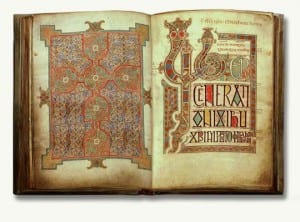A collection of Anglo-Saxon manuscripts from the Parker Library at Corpus Christi, Cambridge, has been digitised and is now available on the internet. Take a look. They are a fabulous glimpse into history. My first thought was how can digital data ever compare with these beautiful pages showing the lost art of illumination, from a time when few could read and even less had access to the expensive inks and vellum parchments. What will we leave behind other than mountains of obsolete system units and monitors and electronic content that’s inaccessible without the means to interpret and display it. But then you realise that without an internet collection we wouldn’t be seeing these manuscripts in the first place. The only ones I’ve seen have been in various museums around the country and the Henry VIII exhibition last year at the British Library (cost in the travel and entrance ticket). So maybe the virtual is better than not having the reality at all. If you need convincing then the British Library’s Turning the Pages should do it. This digitisation of priceless manuscripts has been online for several years. As well as Leonardo, Blake and Austen, it includes treasures like the changing seasons of the Luttrell Psalter and the stunning anglo saxon Lindsifarne Gospels. Virtual history doesn’t get much better than this!
Tag: Turning the Pages
Digitising Siegfried Sassoon?
The collected letters, notebooks etc of Siegfried Sassoon are for sale – http://news.bbc.co.uk/today/hi/today/newsid_8117000/8117156.stm

I don’t know how monetary value (£1.25 million) is established but I do wonder how much technology is destroying work for future archivists. Recently in the British Library for the Henry VIII Man and Monarchy exhibition I looked at the floor to ceiling bookcases housing the Kings Library and wondered what we are sacrificing to have the speed and ease of electronic communication – if anything at all. Should we celebrate or challenge the digitisation of the book? Is the demise of the craft of book binding on a par with baking daily bread on hot stones; is achieving an outcome faster always an improvement to be applauded? Political response to the Luddites was the Frame Breaking Act whereby those guilty of challenging progress could be sentenced to death. What is the Internet equivalent in terms of resistance and sanctions? Occasionally the work network is down; a useful reminder of the extent to which our lives are online – as we tidy our desks and make coffee and feel redundant without our digital connections.
Technology may mean less to preserve in the future. Turning the Pages uses technology to preserve the work of the past and makes it more widely available by digitising some of the rarest books in the world. The digitisation of the works of Siegfried Sassoon would make them accessible to a wider audience. Art needs to be visible. Sassoon’s notebooks from WW1 have additional value for their first hand experience of the madness of war and the later problems of psychological damage and rehabilitation. For this alone they should be preserved and made available. We can all learn from the creative work of others.
But does instant Internet access to the product of human labour devalue it? Are we losing sight of the difference between the real and the replication? Seeing a digital image of a page from the Book of Kells is not enough; we need to know about the hours spent crafting a single letter, the conditions under which it was produced; the cold stone floors, the poor light, the preciousness of the gold and coloured pigments. Poetry is a product of the environment; Sasssoon was a man of his times. The digital page is only ever a part of the story and a danger of digitisation is the increasing separation from the human element – as well as the lack of letters and notebooks and other documents that still retain the human dimension and touch for future generations to reflect on.
